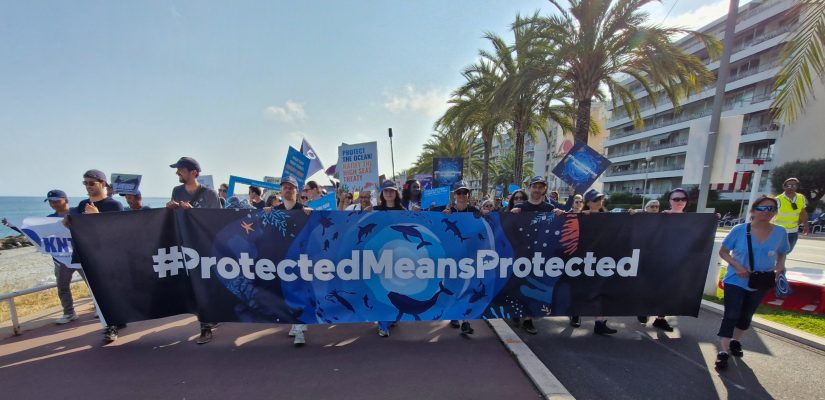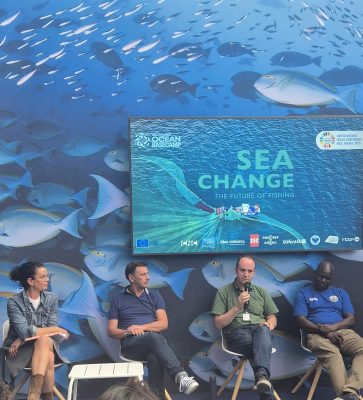The IWT is dedicated to advocating for the protection and restoration of our marine life. To this end, we attended the recent UN Ocean Conference to monitor the proceedings and campaign for urgent marine protection actions from the Irish government and the EU. Below is a report from our Marine Advocacy Officer, Grace Carr, who represented the IWT at the conference

We attended the third UN Ocean Conference in Nice this month along with colleagues from Fair Seas, the Irish Environmental Network and the Irish Whale and Dolphin Group. The Irish Wildlife Trust is part of an EU wide Marine Protected Area project with Seas at Risk (a Brussels based marine eNGO) who helped organise a Blue March before the conference’s official start date. This was to show world leaders that the public believe there is no more time to lose and we need ambitious announcements leading to tangible actions at this year’s conference. Around 2,500 people marched through the streets of Nice, carrying banners and calling for an end to destructive activities in the ocean.
The conference officially kicked off with many world leaders attending the ‘Blue Zone’ and taking part in ocean action panels (discussing issues from unsustainable fishing to strict protection) and plenary sessions. Many governments made a speech including Taoiseach Micheál Martin. Unfortunately, despite stating he wants Ireland to be “a leader” when it comes to marine policy, the Taoiseach didn’t announce any new measures that he planned to take to help protect and restore biodiversity in Irish waters. We have just over 9% of our waters designated as MPAs with the majority of these areas having no site specific management plans and 0% managed under strict protection. We also have unsustainable and unregulated fishing of sprat (a vital forage fish) happening in our coastal bays which is having a huge negative impact on the marine food web and on other fisheries. We are disappointed that the Taoiseach didn’t take this opportunity on a world stage to really show Ireland as a leader in marine policy.
The EU Ocean Pact
The European Ocean Pact was officially released at the conference. Environmentalists were hoping that this pact would ensure countries would have to ACT to protect the ocean and that it wouldn’t be another EU report with vague wording. However, the pact falls short of delivering the binding actions needed to protect our ocean. The pact acknowledges the importance of ocean conservation but for it to be successful it must lead to the immediate implementation of the existing marine protection laws we have in place. Unfortunately, most countries are lagging behind implementation of laws such as the Habitats Directive and the Common Fisheries Policy and the Commission are slow to act on enforcement of these. The pact also fails to provide a clear roadmap to ensure compliance with existing targets and obligations. The Commission stated that 1 billion euro will be invested to support science, conservation and sustainable fishing. This number falls short of what would be needed to effectively support these issues.
Make Fishing Fair
We attended many events over the course of the conference and while political will to make ambitious announcements to protect the world’s oceans were lacking, the passion and expertise that was clear to see from civil society, researchers and conservationists was inspiring. One very informative event we attended was entitled ‘Make Fishing Fair’. Representatives from Low Impact Fishers Europe including Irish Islands Marine Resources Organisation spoke at this event. It was stated that small scale fishers do not get a fair share of a countries quota even though the Common Fisheries Policy has an Article stating that vessels which use less ecologically damaging fishing methods should be incentivised. The industry needs to be more balanced with quota sharing being respected and small scale fishers getting their fair share. Industrial fishing companies can unfortunately buy quotas from small scale fishers finding themselves in difficulty, which essentially privatises a shared resource. Seamus Bonner from IIMRO made some excellent points that low impact fishing needs to be the norm, not the exception. Access to the 12 nautical miles around our shores should also be prioritised for small scale fishers but unfortunately this is not the case in the majority of countries globally.

Make fishing fair event at UN Ocenas Conference
Our Marine Advocacy Officer Grace Carr got the chance to speak at the Ocean Base Camp at the conference and took this opportunity to speak about the unregulated and indiscriminate fishing of sprat in the 6nm zone around the Irish coast. You can watch her full talk on our Youtube channel or linkedIn.
Grace Carr speaks on overfishing at UN Ocean Conference 2025
EU Pledges
Some countries took steps in the right direction but the urgency that’s needed to effectively protect the ocean is still missing. Portugal expanded its MPA network and the UK took another step to banning destructive bottom trawling from its offshore MPAs. A consultation on this will be undertaken before anything is finalised. Other countries reaffirmed promises they had already made such as Sweden (banning bottom trawling in some MPAs) and Denmark (designating further strictly protected MPAs and banning bottom trawling in others). Disappointedly, France, who hosted UNOC, announced they would ban bottom trawling in 4% of their waters – however it turned out this applied to areas where no bottom trawling occurs anyway. Lobbying from large industrial fishing interests seems to have won over many governments.
Some Good News
In better news, the High Seas Treaty (BBNJ) was ratified by further countries. Only 10 more ratifications are needed to reach the stage where there will officially be a law in place to protect waters that are outside countries’ jurisdictions. Ireland still has not ratified the Treaty, although they have said that they plan to when the EU releases its own directive through the BBNJ. 37 countries also called for a precautionary pause on deep sea mining. French Polynesia announced its plan to create the largest MPA in the world, which will be over 5 million square kilometres. Within this 1.1 million square kilometres will be designated as fully protected where only traditional coastal fishing, ecotourism and research will be permitted. Small island states are leading the way when it comes to marine conservation and the EU should follow their example. Several billion dollars were announced by different countries to help support ocean conservation and governance and while this is welcome, it falls short of the amount which is actually needed.
Over 90% of Europe’s marine area is under pressure from human activities. To effectively turn the tide and protect our seas, will require real action and not just words.